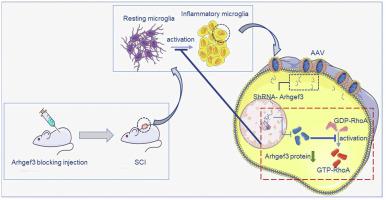Journal of Neuroimmunology ( IF 2.9 ) Pub Date : 2021-08-08 , DOI: 10.1016/j.jneuroim.2021.577688 Liang Liao 1 , Zhan-Yang Qian 2 , Xin-Yu Li 3 , De-Shun Yang 1 , Bing-Jun Lei 1 , Hai-Jun Li 4 , Xin Hong 5

|
Excess inflammatory microglia activation deteriorates the pathological degree of spinal cord injury (SCI). We here employed microglia samples in vitro and murine model in vivo to trace the role of inhibition of Arhgef3 in inflammatory response post SCI. From the specimen analysis of lipopolysaccharide (LPS)-induced inflammatory microglia, we found that Arhgef3 expression was positively relative to microglia activation. In vitro, LPS caused the microglia inflammatory activation and induced upregulation of the Arhgef3 expression. Interestingly, presence of Arhgef3 could activate RhoA through promoting Rho GTPases, but silencing of Arhgef3 decreased RhoA activation and inhibited the microglia inflammation. Moreover, disruption of Arhgef3 inhibited the GTP-RhoA, resulted in a suppression of proinflammatory cytokines, and alleviated the LPS-elicited inflammatory genes expression. Moreover, artificially decreasing Arhgef3 expression remarkedly reduced ROS generation after LPS treatment. In vivo of a mouse mechanical contusion-induced SCI model, inhibition of Arhgef3 reduced the ratio of GTP-RhoA/Total-RhoA, and prevented SCI via mitigating the microglial inflammatory phenotype and decreased secondary neurological injury. Besides, inhibition of Arhgef3 prevented alleviated the degree of demyelination but did not affect neuronal regeneration. Meaningfully, absence of Arhgef3 improved mouse locomotor recovery post SCI. Taken together, Arhgef3 involves the microglial activation and inflammatory response following neural injury, and targeted disrupting of which may indicate a promising therapeutic direction in preventing SCI.
中文翻译:

通过阻断 Arhgef3 表达破坏 RhoA 活性可减轻脊髓挫伤后小胶质细胞诱导的神经炎症
过度的炎性小胶质细胞激活会恶化脊髓损伤 (SCI) 的病理程度。我们在这里使用体外小胶质细胞样本和体内鼠模型来追踪抑制 Arhgef3 在 SCI 后炎症反应中的作用。从脂多糖 (LPS) 诱导的炎症小胶质细胞的标本分析中,我们发现 Arhgef3 表达与小胶质细胞激活呈正相关。体外, LPS 引起小胶质细胞炎症激活并诱导 Arhgef3 表达上调。有趣的是,Arhgef3 的存在可以通过促进 Rho GTP 酶激活 RhoA,但沉默 Arhgef3 会降低 RhoA 激活并抑制小胶质细胞炎症。此外,破坏 Arhgef3 可抑制 GTP-RhoA,抑制促炎细胞因子,并减轻 LPS 引发的炎症基因表达。此外,人为降低 Arhgef3 表达显着减少了 LPS 处理后 ROS 的产生。在小鼠机械挫伤诱导的 SCI 模型体内,抑制 Arhgef3 降低了 GTP-RhoA/Total-RhoA 的比率,并通过以下方式预防 SCI减轻小胶质细胞炎症表型并减少继发性神经损伤。此外,抑制 Arhgef3 可防止减轻脱髓鞘程度,但不影响神经元再生。有意义的是,Arhgef3 的缺失改善了 SCI 后小鼠的运动恢复。综上所述,Arhgef3 涉及神经损伤后的小胶质细胞激活和炎症反应,有针对性地破坏它们可能预示着预防 SCI 的治疗方向。











































 京公网安备 11010802027423号
京公网安备 11010802027423号